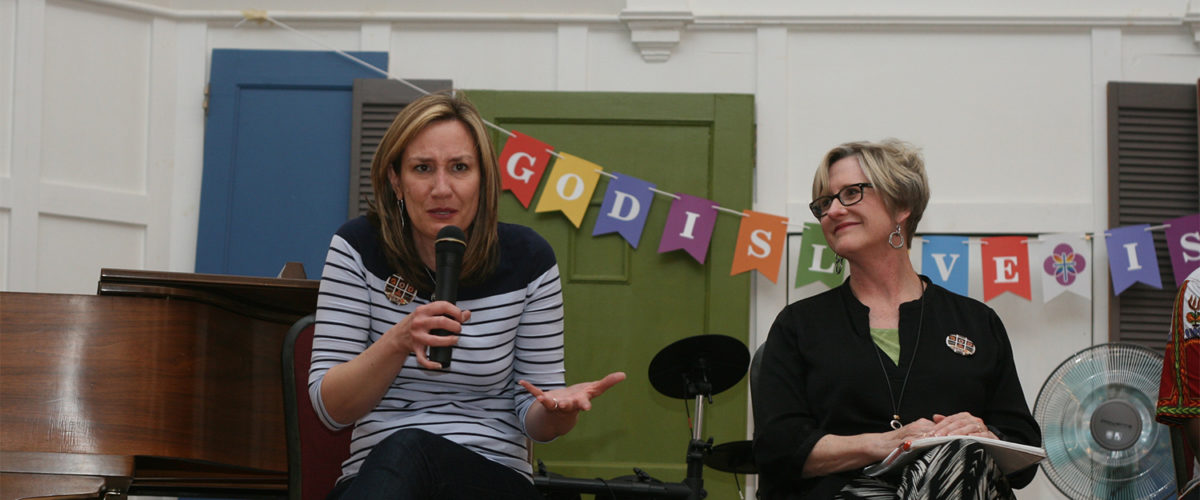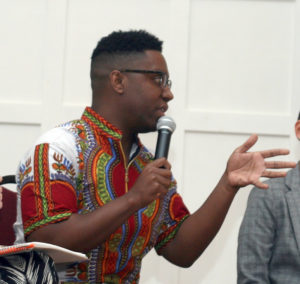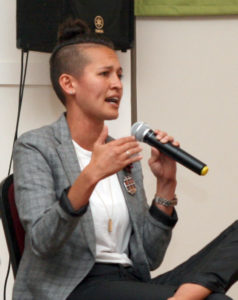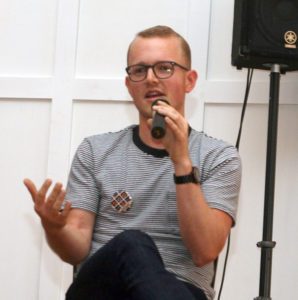Cooperative Baptists who identify as LGBTQ and their allies said the time is now for the Cooperative Baptist Fellowship to drop its policy against hiring staff or missionaries who are openly gay on the eve of the June 28-30 CBF General Assembly in Atlanta.
About 85 people attended the Association of Welcoming and Affirming Baptists’ first-ever ancillary event at a CBF General Assembly, held at Park Avenue Baptist Church in Atlanta.
“Do our people feel safe in this denomination?” Brandon Maxwell, dean of students at Columbia Theological Seminary and pastor of worship and spiritual formation at Park Avenue Baptist Church, asked during a panel discussion on LGBTQ participation in CBF. “Right now our answer is no.”
The event coincides with an “Illumination Project” launched last year by the CBF Governing Board seeking consensus on divisive issues facing local congregations, starting with a policy enacted in 2000 disallowing “the purposeful hiring of a staff person or the sending of a missionary who is a practicing homosexual.”
Charlie Fuller, head of the ad hoc committee leading the project, told the Governing Board June 17 he will report on the Illumination Project during Thursday morning’s business session and in more detail in two workshops. A final report and recommendations are due later this year.
Members of panel discussion and audience warned leaders of the 1,800-church network to count the cost before deciding to uphold the policy.
“When somebody tells you who they are, believe them,” Maxwell said, quoting Maya Angelou. “As a black LGBTQ man, you’ve told me who you are.”
Maxwell said churches like Park Avenue struggle with what it means to call themselves a Baptist church.
“Just a few weeks ago our Southern Baptist sisters and brothers … they couldn’t decide whether or not to pass a resolution to condemn white supremacy,” he said. So every time somebody drives by this church and they see Baptist on the marquee — even though we’ve got these … big old signs that say ‘Everybody’s Welcome,’ ‘No Human is Illegal’ — they see Baptist and they think SBC. They see Baptist and they think CBF hiring policy.”
“SBC, you can’t disavow white supremacy when you are white supremacy,” Maxwell said. “CBF you can’t disavow homophobia when you have homophobia written into your policy. It was there at the beginning. It was what you intended.”
Amelia Markham, Atlanta organizer for the Reformation Project, a Bible-based Christian nonprofit seeking to reform the church’s stance on sexual orientation and gender identity founded by evangelical LGBT advocate Matthew Vines, said after a long journey she found acceptance in a CBF church, but that message doesn’t come across at the denominational level.
“It’s really hard for me to be able to share with LGBTQ people around Atlanta, around the country, that I’m a part of this denomination when all they know — and not just because of the Southern Baptist Convention, but because of Baptist identity and how they see it played out in so many different ways in so many different communities — comes back to how that hiring policy reads,” Markham said.
Panelist Melanie Vaughn-West, pastor of Oakhurst Baptist Church in Decatur, Ga., said when she accepted the invitation from AWAB about a year ago, she didn’t realize it coincided with the CBF meeting.
“Oakhurst gives a miniscule amount of money to CBF because of their hiring policy and will never give any more or even have a conversation about being a part of CBF until that changes,” she said. “There’s part of me that says ‘why am I even sitting up here?’ but that has been the position.”
“Our church is full of LGBT folks, and I would hope whatever denomination we affiliated with — about 30 percent of our members are ordained ministers — I would hope that those people in my church could get a job in whatever denomination we are a part of,” she said.
Panelist Julie Pennington-Russell, pastor of First Baptist Church in Washington, D.C., said in her long experience with CBF that lasting change takes time.
“There was a time when being a woman in ministry was about the most outrageous thing you could be in Baptist life,” she said. “We sitting here today can hardly imagine a time when that was true, but it was, and that was just 20 years ago, and now I’m looking at the faces of women pastors all over this room. I think there has already been a tipping point with regard to LGBTQ inclusion in the church. I really do believe that.”
Another panelist, Baptist layman Preston Sneed, responded to a question about what CBF leadership could do in the next two or three years to make him feel like he is part of the organization and it is something he can support.
“I would expect the same opportunities as a gay man as I would if I were straight,” he said. “I think as a gay man I have a lot of talents to offer to the church in a meaningful way.”
“I’m not one to beat down the door and seek leadership opportunities, but if I were going to answer this truthfully I would say there shouldn’t be a difference for me from anyone else,” Sneed said. “I’m not saying this because I think I’m good or great, but I think the church is missing out on a lot of talent, a lot of people who could really contribute to the church.”
Things got more animated after the 45-minute panel discussion in a Q&A.
Wendell Griffen, pastor of New Millennium Church in Little Rock, Ark., the only AWAB church in Arkansas, said his church plant started out dually aligned with CBF and the National Baptist Convention, USA, Inc.
“I left National Baptists — all of my ancestors were National Baptists — I left National Baptists because they do not affirm women and because they do not affirm LGBTQ,” Griffen said. “If I can leave left National Baptists, by God I can leave CBF. I don’t say that to be mean. I say that to say that’s a historical fact.”
Griffen said he sees LGBTQ persons being oppressed in 2017 the same way Southern Baptists oppressed black people in 1845.
“I don’t need a lot of illumination about this,” he said. “I love the people in CBF. I’ve got good feelings for them. I’ve got good feelings for my family who don’t love my LGBT people. I won’t invite them into my house. We’re kinfolk, but you can’t bring hate into my house, and I ain’t going to stay in your house if you hate.”
Bojangles Blanchard, a gay Baptist minister in Louisville, Ky., thanked AWAB for a forum he said is long overdue.
“This is not a novel idea that we’ve just come up with,” he said. “So many times we’ve gone to CBF in plenty of time to set up workshops at the General Assembly to talk about LGBT inclusion, and instead they had straight pastors speak for us. We’re not even worthy of speaking to our own inclusion. The frustration continues to build. We’re told to wait. Things take time. Even though our churches continue to send money to CBF, it takes time to give us equality.”
Blanchard urged CBF leaders not to be overly influenced by fear of financial fallout from conservative churches if the policy is changed.
“They say money answereth all things, but it hindereth a hell of a lot too,” he said. “We need to say in this whether you are gay, straight, bi or trans, it doesn’t matter, but I want you to remember how long LGBT people have been waiting out on the steps of these churches, assuming a different role when they come through the door. How humiliating, and it continues.”
“There are not many LGBT voices involved in the Illumination Project,” Blanchard said. “It’s about us, but they’re not going to talk to us about it. I am beyond frustrated, but this is promising. Thank you all.”





